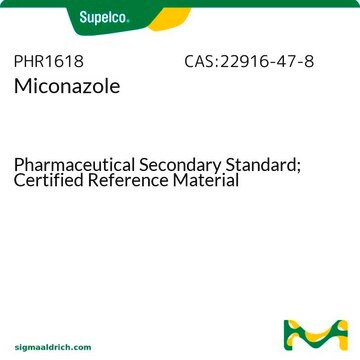1443409
USP
Miconazole
United States Pharmacopeia (USP) Reference Standard
Synonym(s):
(±)-1-[2-(2,4-Dichlorobenzyloxy)-2-(2,4-dichlorophenyl)ethyl]-1H-imidazole
About This Item
Recommended Products
grade
pharmaceutical primary standard
API family
miconazole
manufacturer/tradename
USP
application(s)
pharmaceutical (small molecule)
format
neat
storage temp.
2-8°C
InChI
1S/C18H14Cl4N2O/c19-13-2-1-12(16(21)7-13)10-25-18(9-24-6-5-23-11-24)15-4-3-14(20)8-17(15)22/h1-8,11,18H,9-10H2
InChI key
BYBLEWFAAKGYCD-UHFFFAOYSA-N
Looking for similar products? Visit Product Comparison Guide
General description
Application
- Miconazole Compounded Ophthalmic Solution
Analysis Note
Other Notes
related product
Signal Word
Warning
Hazard Statements
Precautionary Statements
Hazard Classifications
Acute Tox. 4 Oral - Aquatic Chronic 4
Storage Class Code
11 - Combustible Solids
WGK
WGK 3
Flash Point(F)
Not applicable
Flash Point(C)
Not applicable
Certificates of Analysis (COA)
Search for Certificates of Analysis (COA) by entering the products Lot/Batch Number. Lot and Batch Numbers can be found on a product’s label following the words ‘Lot’ or ‘Batch’.
Already Own This Product?
Find documentation for the products that you have recently purchased in the Document Library.
Customers Also Viewed
Our team of scientists has experience in all areas of research including Life Science, Material Science, Chemical Synthesis, Chromatography, Analytical and many others.
Contact Technical Service





